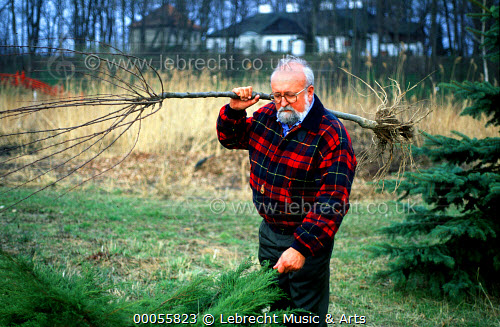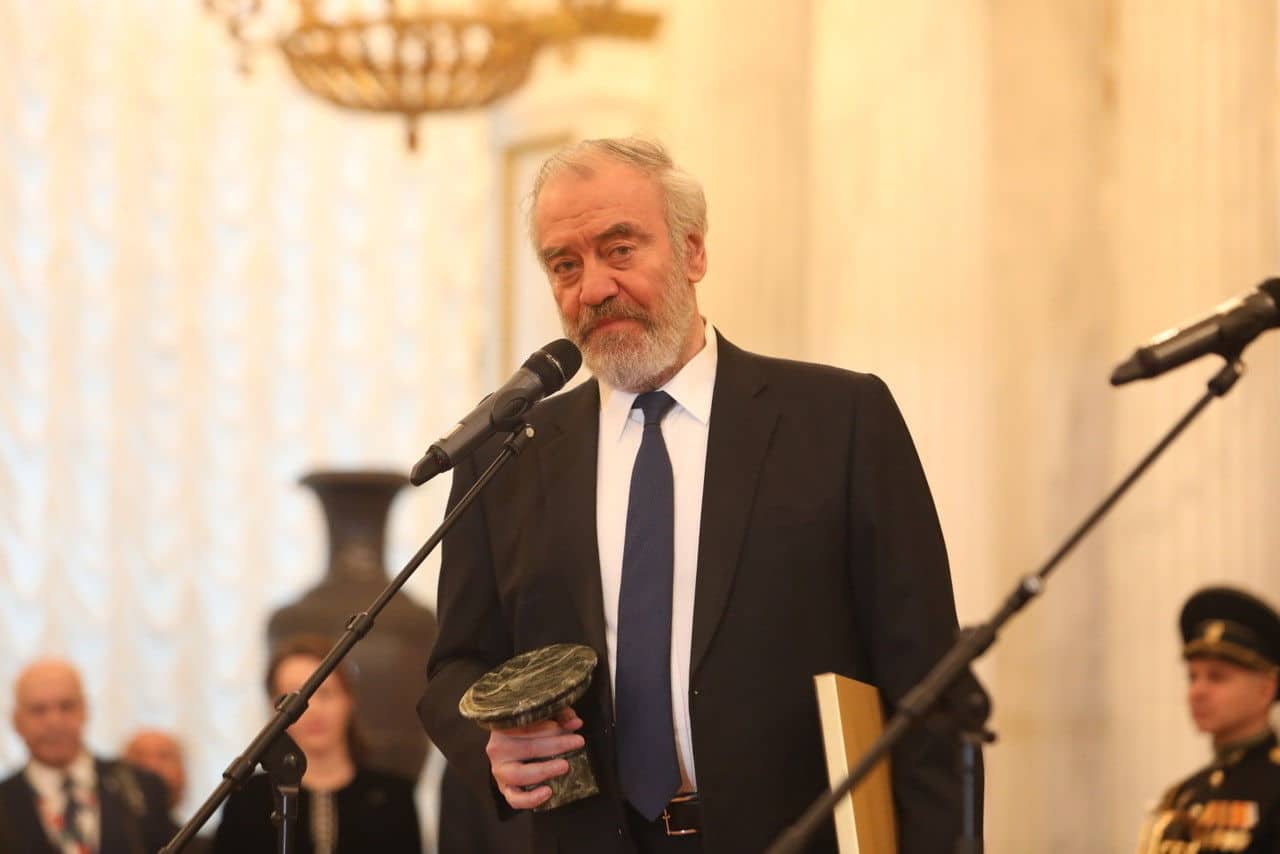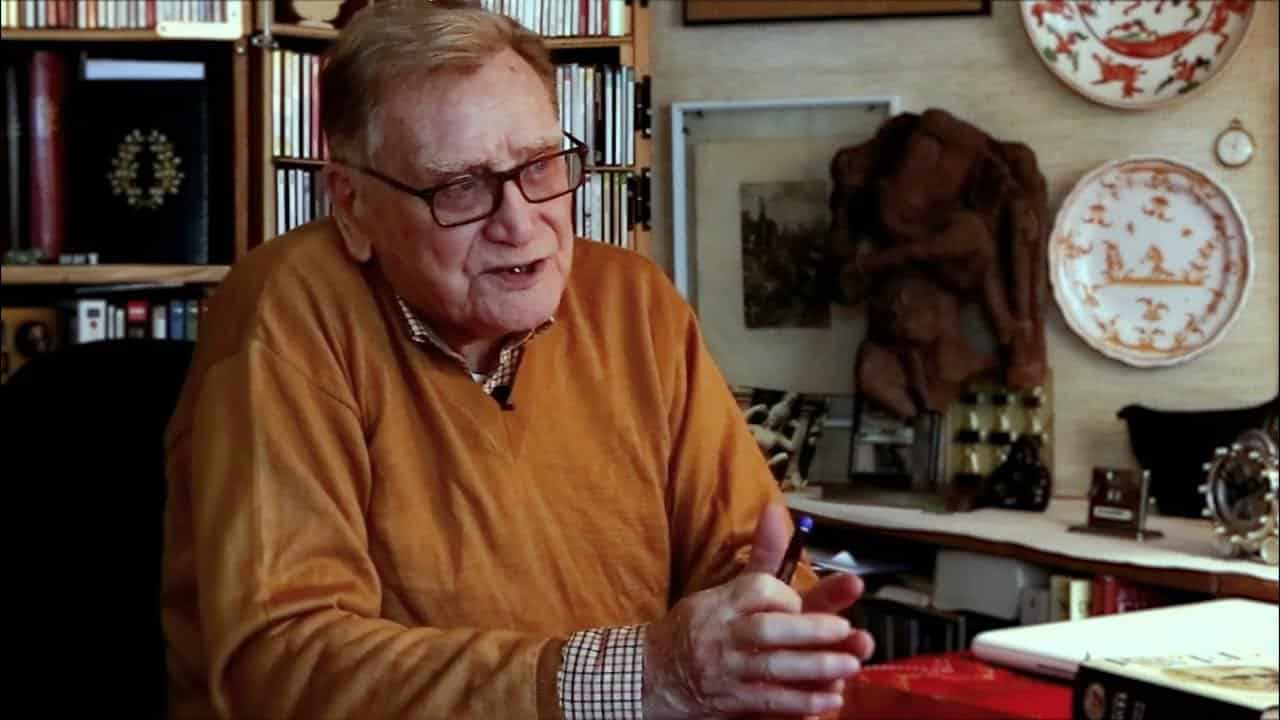Penderecki: I spoke Yiddish as a boy
mainThe Polish composer, 85 this year, has been talking about his life to Vesa Siren.
Among the revelations:
‘I grew up in a community that was predominantly Jewish. I also spoke Yiddish. Then Hitler came and destroyed 90% of the Jews in Poland.’ (His home town was Dębica.)
On the Soviet massacre at Katyn: ‘My uncle was killed there.’
Full interview here (in Finnish).






Not always my favorite among living composers, but a very good one and a very interesting man.
The most interesting thing about Penderecki is his ‘conversion’ to a new form of traditional, tonal music. A bit too generous with the pot with chromaticism I think, but certainly much more musical and expressive than his earlier sonic art. But he did not loose his taste for the extreme – here is an impressive symphony consisting of one long movement of 40 minutes, full of pathos and dark tragedy:
http://www.youtube.com/watch?v=jfo_CdAqNsg
For a celebration of the French Revolution the music raises some doubts.
I was just about to mention how fascinating Penderecki’s conversion away from his early avant garde style was, but you beat me at it.
I was present at the concert at the Wigmore Hall when his String Quartet No. 4 was premiered (Penderecki was also in the audience). Before that, they also played his String Quartet No. 2. This was a perfect example of sonic art as you would call it, stylistically it reminded me very much of his famous Threnody for the Victims of Hiroshima. To my ears, deeply irritating and almost unlistenable.
The String Quartet No. 4 was completely different and I can say that it was a pleasure to listen to it. It also got a greater applause from the audience. This is just my two cents – I can expect to be obliterated by the fans of early P’s style., but this was my impression.
Very interesting! You can trust your ears…. P’s early works were meant to be pulverizing. It was understandable after WW II but by now, that very war is really over.
Yes, very interesting. This is not a composer whose work I know all that well, but the question that springs to mind is- how on earth, if you have any sort of natural creative voice of your own, can it be possible to change horses mid-stream in that way?
Evolve and develop, sure. Wagner did that in a most spectacular way, without losing his creative identity. On the other hand, Schönberg devised his new way as an ingenious response to his own shortcomings and in doing so became a sort of patron saint for future generations of the moderately gifted. Both these scenarios make sense to me.
But the case of Penderecki to me is baffling, I just wonder what it was he thought he was doing before his conversion.
==Schönberg devised his new way as an ingenious response to his own shortcomings and in doing so became a sort of patron saint for future generations of the moderately gifted.
Ha – very well described, David
This way of so drastically ‘change horses’ (I would say: motor cycles), could be explained by the observation that atonal avantgarde music is entirely artificial and does require clever handling of sound patterns but not the specific talent for musical composition (that is the reason so many people practice it). It is to P’s great credit that he had much more baggage and did not let modernist fashions hinder it. A comparable case is the American composer George Rochberg who developed as a well-respected atonal modernist and then ‘unlearned’ his habits and wrote traditional, tonal music inspired by late Beethoven and Mahler.
Also Schoenberg’s development was gradual, from overripe chromatic late romanticism via desintegrating expressionism to ‘objective’ 12-tone ‘classicism’ (and infinite sadness).
Tubaphones from the 7th symphony, “Gates of Jerusalem”:
https://www.youtube.com/watch?v=l055c5lJMt4
It’s not unusual (re: Yiddish) – non-Jews who lived in Jewish neighborhoods frequently acquired some knowledge of the language. James Cagney, who grew up on the Lower East Side of Manhattan, could speak Yiddish.
And the other way around, a majority of Jews speak the language of the country they live in.
It is interesting to read what Wagner wrote about what he thought was a ‘Jewish problem’, because he claimed it was rooted in language and hence, Jews were supposed to not been able to write really good music because both language and music were rooted in deep layers of the subconscious. As we know, his aintisemitism was a collossal blunder and the link with language entirely superficial and irrelevant. That Jews quickly after their liberation from the ghettos in the early 19C became masters in both language and music, was a source of puzzlement and anxiety for Wagner and other antisemites.
I worked with an American Black who had been a musician at one of the “Borsht Belt” hotels in the 1960s (Borsht Belt hotels were kosher resort hotels in upstate New York that until the 1980s largely catered to Jews) He spoke Yiddish. I would imagine that members of other ethnic groups who work in Haredi (ultra Orthodox) Jewish businesses do also
At a high school music and arts camp the wind ensemble chose a work of Penderecki for the concert, with the type of notation also used in Threnody for the Victims of Hiroshima. We (the kids) thought it was fascinating. It took a lot of guts and creative juices to do such a piece with high school kids. My parents were horrified. Fortunately for them, a couple of hours late I played Tchaikovsky 4 in the orchestra, which made them happy again. But for me the Penderecki was an eye-opening experience.
I read that in Germany there is an educational programme for kindergarten and primary schools to teach children to listen to and understand atonal sonic art, so that there will be something like future audiences for the art form. Without exception, all children love it (it does not need specific musical perception talents).
“Without exception, all children love it (it does not need specific musical perception talents).”
I know what you’re saying John. But I have learnt from spending a considerable amount of time working with children, that they tend to possess two remarkable talents:
1. An amazing ability to give adults the answer they feel that they (the adults) want to hear.
2. An equal ability to identify good music when they hear it, when left alone to decide for themselves.
Agreed….!
Fascinating comment, written as it is in a way that allows us, through the way the words relate with each other, to not only comprehend their literal meaning, but also identify a clear subtext.
We notice the following correlations: Tchaikovsky 4: stuffy, conservative, old fashioned= parents. Penderecki’s Threnody: fascinating, innovative, creative, gutsy=youthful and modern. It is a story we have gotten so used to hearing, shared as it has been (somewhat ironically don’t you think) across generations, that to many it has simply become an accepted truth.
Putting aside for a moment the fact that the Threnody was written in 1960, (and is therefore about as modern in a literal sense as Cliff Richard), would children, if given a choice, really choose cluster chords, aleatoric experimentation, playing behind the bridge and micro-tonalism over contemporary work created in a musical language that has evolved naturally and concurrently with the spoken sort, over more than a millennium? At present we cannot with certainty answer that question, because the latter approach is by and large still under prohibition, but we can speculate by looking at evidence from the art world as a whole.
Fortuitously, the single most successful work of art for children in history, is a relatively modern one. I’m referring to the Harry Potter book series by J K Rowling. And no, it does not depend on how you define successful, the evidence for this is both overwhelming and quite staggering. In particular I would include some extraordinary educational outcomes. It is however worth noting the literary language in which these books are written. It is very much the language of C.S. Lewis, of A.A. Milne, of Lewis Carroll. Not to mention that of Jane Austen, the Brontes and Dickens. When the first of these works was submitted to the publisher they did not react by saying “we can’t possibly publish this, it’s written in the language of the past”. That is something that only happens in the world of contemporary classical music. Conversely, I can’t really think of an even moderately successful avant-garde literary work for children. Meaning one that dispenses completely with in a conventional sense, meaningful word relationships.
It would be interesting to produce a children’s version of Joyce’s Ulyssus and see how they get on with it.
Language and music are comparable, up to a point, but are not the same. But indeed, a French composer of stature like Nicolas Bacri, although he is regularly peformed, is not considered the important contemporary voice he obviously is, since that accolade goes – including generous subsidies – to someone like Pascal Dusapin who follows in the wake of Boulez and Murail: Klangkünstler. When Jerome Ducros – famous and brilliant pianist – held an ironic lecture at the Collège de France in 2012, showing the limitations of atonality, he was hounded by the French modernist establishment.
In fact, Dusapin is slowly moving from Boulezbian sonic art towards a pretentious tonal expressionism (as in early 20C), as morbid as possible (because that is ‘contemporary’), but that someone like Bacri goes much farther is apparently unacceptable.
http://www.youtube.com/watch?v=XPqBK7rvijQ
http://www.youtube.com/watch?v=ym0F8bUERkk
http://www.youtube.com/watch?v=LdYCSGSEHZ4
Bacri song is gorgeous by the way. LIke a contemporary ‘Nuits d’été’.
Indeed….. and he is, like Penderecki, a convert from modernism: his early works are of a pulverizing but brilliant ugliness. Hearing a simple one-tone piece by Scelsi was enough to puncture his modernist balloon and he relearned traditional craft and beauty and expression. Together with Karol Beffa, Thierry Escaich, Guillaume Connesson and Richard Dubugnon the hope for french new music.
Hey John, you need to change the link to the Ducros lecture, College de France made a copyright claim against it. You can watch it here: http://www.college-de-france.fr/site/en-karol-beffa/seminar-2012-12-20-15h00.htm
Thank you…. that is very helpful.